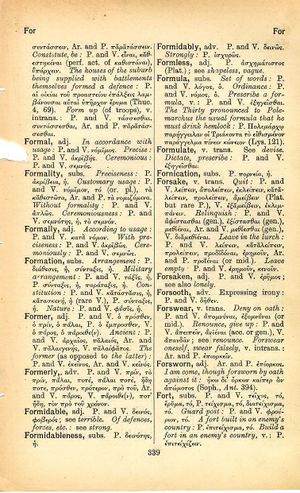fort: Difference between revisions
From LSJ
τούτων γάρ ἑκάτερον κοινῷ ὀνόματι προσαγορεύεται ζῷον, καί ὁ λόγος δέ τῆς οὐσίας ὁ αὐτός → and these are univocally so named, inasmuch as not only the name, but also the definition, is the same in both cases (Aristotle, Categoriae 1a8-10)
(Woodhouse 3) |
(CSV4) |
||
| Line 1: | Line 1: | ||
{{ | {{Woodhouse1 | ||
| | |Text=[[File:woodhouse_339.jpg|thumb|link={{filepath:woodhouse_339.jpg}}]]'''subs.''' | ||
P. and V. [[τεῖχος]], τό, [[ἔρυμα]], τό, P. [[τείχισμα]], τό, [[διατείχισμα]], τό. | |||
<b class="b2">Guard post</b>: P. and V. [[φρούριον]], τό. | |||
<b class="b2">A fort built in an enemy's country</b>: P. [[ἐπιτείχισμα]], τό. | |||
<b class="b2">Build a fort in an enemy's country</b>, v.: P. ἐπιτειχίζειν. | |||
}} | }} | ||
Revision as of 09:41, 21 July 2017
English > Greek (Woodhouse)
subs.
P. and V. τεῖχος, τό, ἔρυμα, τό, P. τείχισμα, τό, διατείχισμα, τό. Guard post: P. and V. φρούριον, τό. A fort built in an enemy's country: P. ἐπιτείχισμα, τό. Build a fort in an enemy's country, v.: P. ἐπιτειχίζειν.

